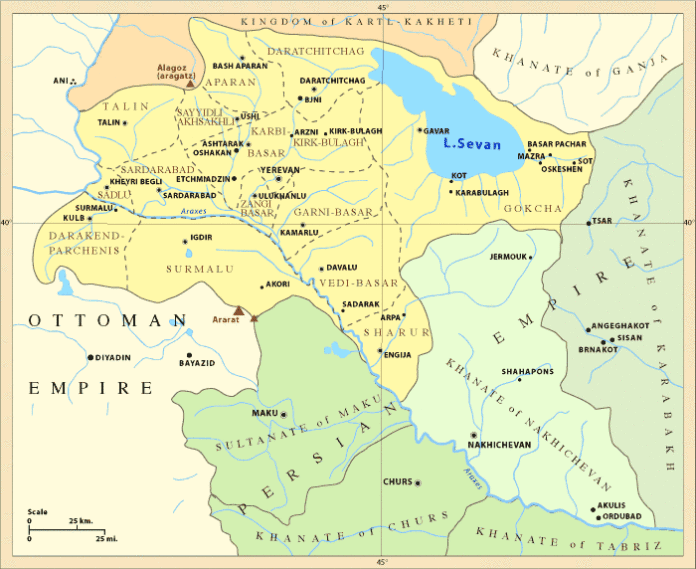According to Ivan Shopen’s (Chopin) statistical account of the Yerevan Khanate – “A Statistical Survey for the Administration of the Armenian Province” (in Russian – «Камеральное описание Армянской области»), the total population of the khanate was 115.106, of which Muslims- 49.872, Armenians- 65.234.
Shopen stayed three years in Yerevan (1829-1832) and prepared the first statistical account of the area based on Russian military figures, interviews with the population, and the Persian tax records of the previous administration.
The Muslim population of the khanate consisted of Persians (Shii), Kurds (Shii and Sunni), and Turkish nomads.
The total number of Turkish nomads in Yerevan khanate in Persian times exceeded 20.000. Ten percent (about 1.800 nomads or 350 families- most of whom belonged to the Buyuk-Chobankara tribe), therefore, left the khanate immediately following the war.
Tribe Families Population
Karapapakh 840 4.619
Ayrumlu 631 3.484
Seidlu-Akhsakhlu 311 1.754
Moganlu 200 1.100 (est.)
Saadlu 160 1.004
Shahdelu (Qajar) 164 995
Buyuk-Chobankara 159 988
Sadaraklu (Qajar) 149 940
Qafarlu 98 652
Tashanlu 124 565
Sarashlu 90 541
Karim-Beglu 55 357
Chahirlu 57 308
Sheikhlar 34 232
Damirchilu 31 228
Godaklu 24 158
Jafarlu 16 82
Ali-Sharurlu 12 75
Gorgi-Bashlu 13 72
Karabaghlu 12 68
Jam-Melli 10 65
Total 3.190 18.287
A history of Eastern Armenia (the Yerevan Khanate was part of it) between 15th century and the Russian conquest (1828) may be divided into five periods (George A. Bournoutian, “Eastern Armenia in the Last Decade of Persian Rule, 1807-1828”, p. 7);
the period of nomadic domination by various Turkic tribes (ca. 1400-1500),
the early Safavid era (1501-1603);
the middle and late Safavid period (1604-1722);
the time of political upheavals and semiindependent activity of former vassals (1723-1795);
the Qajar period (1795-1828).
Map – Erevan Khanate












